It’s natural to want to share your favorite snacks with your furry best friend, often reaching for a piece of fruit or a crisp vegetable instead of a standard dog treat. After all, if it’s healthy for you, it must be perfectly fine for your canine companion, right? Not necessarily. Dogs digest foods differently than humans, and while many “people foods” are safe in moderation, some can be highly unhealthy, even dangerous, leading to long-term health problems or, in extreme cases, fatality. Understanding What Fruits And Vegetables Should Dogs Not Eat is crucial for every pet owner.
While dogs are omnivores and can derive some nutritional benefits from certain fruits and vegetables, they don’t have a strict dietary need for them. However, offering dog-safe fruits and vegetables as occasional treats or snacks can provide extra vitamins, minerals, and hydration. It’s essential to educate yourself on which produce items are acceptable and which should be strictly avoided to ensure your dog’s safety and well-being. This guide will walk you through the fruits and vegetables that are generally safe in moderation and, more importantly, highlight those that pose a significant risk, helping you avoid common pitfalls when sharing your plate. For a broader understanding of what human foods to avoid, explore what are some foods that dogs can’t eat.
Fruits Dogs Can Eat
When given in moderation and prepared correctly, many fruits can serve as delicious and healthy treats for dogs, offering a valuable source of vitamins, minerals, and antioxidants. Here’s a list of dog-friendly fruits you can share as an occasional snack, along with important considerations.
Apples
Apples are an excellent source of vitamins A and C, and fiber, making them a beneficial snack for your dog. They are low in protein and fat, which makes them an ideal choice for senior dogs. However, always remember to remove the seeds and core before offering them to your dog, as apple seeds contain small amounts of cyanide. Frozen apple slices can be a refreshing treat on a warm day. You might also find apples as an ingredient in various dog treats specifically formulated for canine consumption.
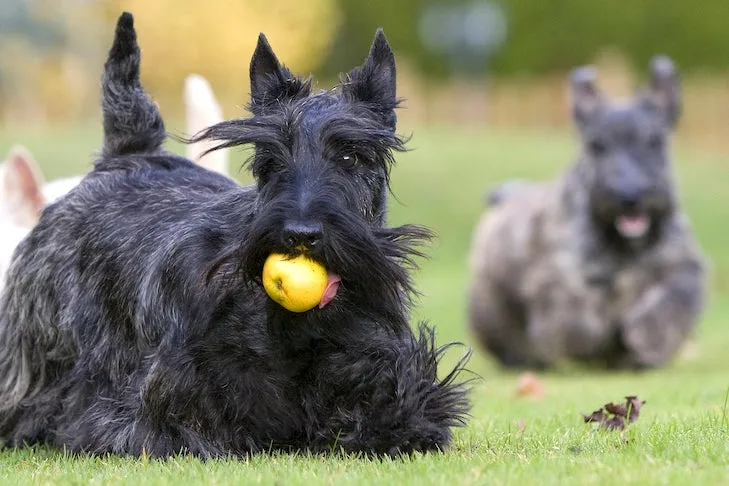 Scottish Terriers playing in the grass
Scottish Terriers playing in the grass
Bananas
In moderation, bananas are a great low-calorie treat for dogs. They are rich in potassium, vitamins, biotin, fiber, and copper, while being low in cholesterol and sodium. Due to their relatively high sugar content, bananas should be given sparingly as a treat rather than a regular part of your dog’s main diet. Many commercial dog treats also feature banana, offering a convenient way to give your dog this fruity delight without the mess of overripe fruit.
Blueberries
Often called a “superfood,” blueberries are packed with antioxidants that help prevent cell damage in both humans and canines. They also provide a good source of fiber and phytochemicals. Blueberries are small and easy for dogs to eat, making them excellent for training rewards or even teaching your dog to catch treats in the air. Their nutritional profile makes them a popular ingredient in many dog treats, sometimes combined with other beneficial ingredients like yogurt.
Cantaloupe
Cantaloupe is highly nutritious, low in calories, and an excellent source of water and fiber, making it hydrating and filling for dogs. However, its sugar content means it should be given in moderation, particularly to dogs who are overweight or have conditions like diabetes. Freezing small balls or cubes of cantaloupe can create a refreshing and engaging enrichment snack for your dog during warmer months.
Cranberries
Both fresh and dried cranberries are safe for dogs in small quantities. While their tart taste might not appeal to every dog, they offer antioxidants. Moderation is key, as too many cranberries can lead to an upset stomach. It’s important to note that many dried cranberries for human consumption are heavily sweetened, adding unnecessary sugar to your dog’s diet. Opt for unsweetened fresh or frozen cranberries, or choose specially formulated crunchy cranberry dog treats.
Cucumbers
Cucumbers are an excellent choice for dogs, especially those who are overweight, as they are extremely low in carbohydrates and fat, and rich in hydrating water. They also provide vitamins K, C, and B1, along with potassium, copper, magnesium, and biotin. Cool cucumber slices make a superb hot weather treat, and frozen slices can offer an engaging enrichment activity.
 Russell Terrier with cucumber slices on eyes
Russell Terrier with cucumber slices on eyes
Mango
This sweet, juicy tropical fruit is loaded with vitamins A, B6, C, and E, as well as potassium, beta-carotene, and alpha-carotene. When feeding mango to your dog, always remove the hard pit first, as it contains small amounts of cyanide and poses a choking hazard. Like many fruits, mango is high in sugar, so it should be offered only as an occasional treat, especially for dogs prone to weight gain. For a less messy option, consider chewy mango dog treats that deliver the nutritional benefits.
Oranges
Veterinarians generally agree that oranges are safe for dogs to eat, though many dogs are naturally deterred by their strong citrus scent and taste. Oranges are an excellent source of vitamin C, potassium, and fiber. In small quantities, the juicy flesh can be a tasty treat. It’s recommended to remove the orange peel entirely, as it can be tough on a dog’s digestive system, and the essential oils may be irritating. Also, ensure all seeds are removed. If your dog doesn’t fancy fresh citrus, there are dog treats that incorporate orange flavor.
Peaches
Small amounts of fresh or frozen cut-up peaches are a good source of fiber and vitamin A. However, just like cherries, peach pits contain cyanide. It is crucial to completely cut the flesh away from the pit, ensuring the pit is safely discarded in a dog-proof container. Avoid canned peaches, which typically contain high amounts of sugary syrups; even those labeled “in natural juice” usually have more sugar than a dog needs. Frozen peach slices can be a delightful and cooling summer enrichment snack.
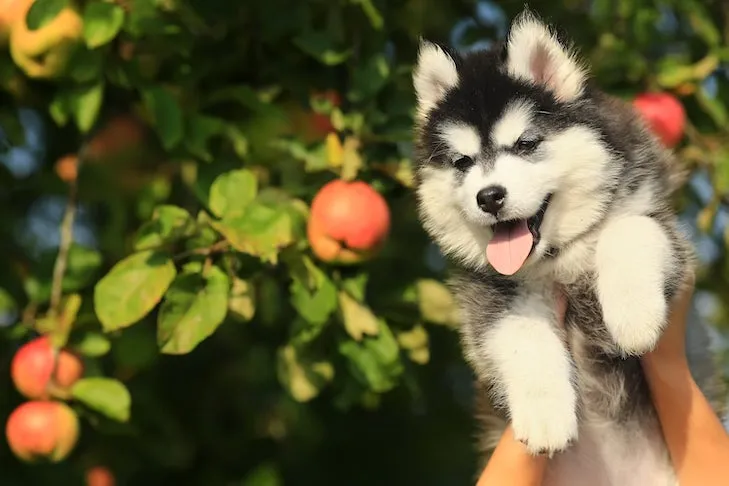 Siberian Husky puppy held up in front of an apple tree
Siberian Husky puppy held up in front of an apple tree
Pears
Pears are a great snack due to their high content of copper, vitamins C and K, and fiber. When sharing pears with your dog, always cut the flesh into bite-sized chunks and remove the pit and seeds, as pear seeds contain traces of cyanide. As with peaches, avoid canned or jarred pears with sugary syrups. For a convenient option, pear dog treats are available, sometimes fortified with other functional ingredients like duck or salmon.
Pineapple
A few chunks of pineapple can be a sweet and delightful treat for dogs, provided the prickly outer peel and tough crown are thoroughly removed. This tropical fruit is rich in vitamins, minerals, and fiber. It also contains bromelain, an enzyme that can aid in protein absorption. Again, steer clear of canned or packaged pineapple in sweetened syrups due to added sugars, which are unnecessary and unhealthy for dogs, especially those prone to obesity. Pineapple dog treats offer an easy way to give your dog a taste of this tropical fruit.
Pumpkin
Pure pumpkin is a highly beneficial food for dogs. It’s full of antioxidants, but its most recognized benefit is its ability to relieve both diarrhea and constipation in dogs. If you opt for canned pumpkin, always choose 100% pure pumpkin puree, not pumpkin pie filling, which contains spices and added sugars. Alternatively, you can roast pumpkin yourself and feed the peeled, cooked flesh to your dog. Many pumpkin supplements and pumpkin dog treats are also available, making it easy to incorporate this superfood into your dog’s diet. If your dog is experiencing an upset stomach, pumpkin can be a helpful addition, which ties into understanding what food is good for dogs upset stomach.
Raspberries
Raspberries are safe for dogs in moderation. They are rich in antioxidants, low in sugar and calories, but high in fiber, manganese, and vitamin C. These properties make raspberries particularly beneficial for senior dogs, as their anti-inflammatory compounds can help support aging joints. However, raspberries contain small, naturally occurring amounts of xylitol, a sugar alcohol that is highly toxic to dogs in larger quantities. For this reason, limit your dog to no more than approximately 8 ounces (about a handful) of fresh or frozen raspberries. Many dog treats also include raspberry as a safe ingredient.
Strawberries
Strawberries are packed with fiber and vitamin C, and they also contain an enzyme that can help naturally whiten your dog’s teeth. Like all fruits, strawberries contain natural sugar, so they should be offered in moderation as a treat. Frozen strawberries can provide an engaging enrichment activity. For a fun alternative, you could hide your dog’s favorite strawberry training treat in a strawberry-shaped snuffle mat.
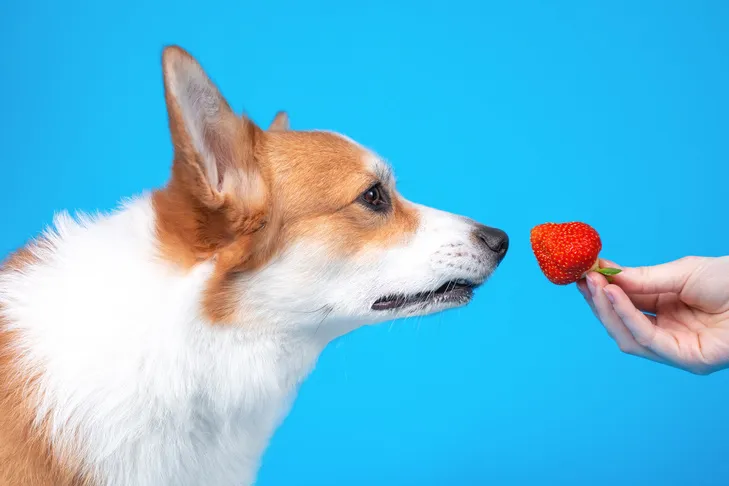 Pembroke Welsh Corgi and strawberry
Pembroke Welsh Corgi and strawberry
Watermelon
Dogs can safely eat watermelon, but it’s crucial to remove all seeds and the rind beforehand, as these can cause intestinal blockages. The watermelon flesh, however, is a healthy treat, rich in vitamins A, B-6, and C, as well as potassium. Composed of 92% water, watermelon is an excellent way to help keep your dog hydrated, especially on hot summer days. Freezing chunks of seeded watermelon makes for a great hot-weather enrichment treat. You can also find watermelon-flavored dog treats designed for canine consumption. Knowing what fruits and vegetables are safe is part of a broader understanding of what is good human food to feed dogs.
Fruits Dogs Should AVOID
While many fruits are perfectly healthy for humans, some contain compounds, seeds, or parts that are dangerous, if not toxic, to dogs. It is imperative to keep these fruits out of your dog’s reach to ensure their safety and prevent serious health issues. This section directly addresses what fruits and vegetables should dogs not eat, starting with hazardous fruits.
Avocado
Despite being a healthy snack for humans, avocado should never be given to dogs. The pit, skin, and leaves of avocados contain persin, a fungicidal toxin that can cause vomiting and diarrhea in dogs. While the fleshy inside of the avocado fruit contains less persin than other parts of the plant, it can still be problematic for dogs. Additionally, avocado flesh is high in fat, which can lead to gastrointestinal upset or contribute to serious conditions like pancreatitis in dogs if consumed in large quantities. If you want your dog to benefit from avocado’s healthy fats, look for dog treats specifically formulated for skin and coat health that include avocado as an ingredient, ensuring the persin content is safely managed.
Cherries
With the exception of the ripe fleshy fruit around the seed, all parts of cherry plants—including the leaves, stems, and especially the pits—contain cyanide. Cyanide is highly toxic to dogs as it disrupts cellular oxygen transport, preventing their blood cells from receiving enough oxygen. If you have a cherry tree in your yard, ensure your dog does not have unsupervised access to fallen fruit. If your dog consumes whole cherries or cherry pits, watch for signs of cyanide poisoning, such as dilated pupils, difficulty breathing, and red gums, which constitute a veterinary emergency. When you enjoy cherries, always dispose of the pits securely in a dog-proof trash can and instruct children not to share cherries or pits with the dog. To safely provide your dog with the antioxidant benefits of cherries, consider specially formulated cherry-flavored dog treats.
Grapes and Raisins
Grapes and raisins are exceptionally toxic to dogs, regardless of breed, sex, or age. Even a small amount can lead to acute sudden kidney failure. If you suspect your dog has eaten any grapes or raisins, contact your veterinarian immediately; this is a medical emergency. Always be vigilant about keeping these fruits out of your dog’s reach, especially in households with children who might drop them. Ensure that grapes or raisins are never disposed of in an accessible compost heap and that your trash cans are dog-proof.
Tomatoes (Green Parts)
While the ripened flesh of a red tomato fruit is generally considered safe for dogs, the green parts of the tomato plant—including the leaves, stems, and unripe green tomatoes—contain a toxic substance called solanine. A dog would typically need to consume a large quantity of the plant material to become severely ill. However, to be completely safe, it is generally recommended to avoid feeding any part of the tomato plant to dogs. If your dog enjoys exploring your vegetable garden, take measures to prevent access to your tomato plants.
 Rottweiler laying in the yard with tilted head
Rottweiler laying in the yard with tilted head
Vegetables Dogs Can Eat
Understanding which vegetables are safe for your dog is just as important as knowing what to avoid. Many vegetables offer valuable nutritional benefits and can be a healthy addition to your dog’s diet when prepared correctly and given in moderation. Here are some vegetables you can confidently chop up and share with your dog.
Broccoli
Broccoli is safe for dogs to eat in small quantities and is best served as an occasional treat. It’s high in fiber and vitamin C and low in fat. However, broccoli florets contain isothiocyanates, compounds that can cause mild to potentially severe gastric irritation in some dogs if consumed in large amounts. The tough stalks of broccoli have also been known to cause esophageal obstruction in dogs. If your dog enjoys broccoli, it’s safer to offer it cooked and in small, manageable pieces to minimize these risks. Alternatively, a broccoli-shaped dog chew toy can satisfy their urge to chew without any dietary risks.
Brussels Sprouts
Brussels sprouts are packed with beneficial nutrients and antioxidants that are good for both humans and dogs. However, moderation is crucial; feeding too many Brussels sprouts can lead to excessive gas and digestive discomfort in your dog. If your dog is a fan and you’re prepared for the potential gaseous aftermath, you might consider some dehydrated dog foods that include these leafy greens as a wholesome component.
Carrots
Carrots are an excellent low-calorie snack, rich in fiber and beta-carotene, which converts to vitamin A in the body. Furthermore, the crunchy texture of carrots can be beneficial for your dog’s dental health, helping to clean their teeth. Carrots are a common ingredient in many commercial dog foods and are widely available in various forms of carrot dog treats.
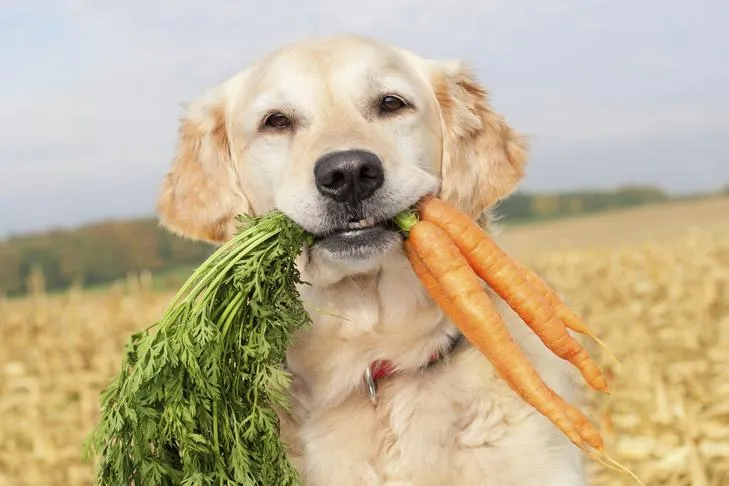 Golden Retriever holding carrots
Golden Retriever holding carrots
Celery
In addition to providing vitamins A, B, and C, celery contains nutrients that can support heart health and potentially help fight cancer in dogs. As an added bonus, celery is also known for its ability to help freshen doggy breath. Many dogs enjoy the satisfying crunch of celery, and you can find celery dog chews for a convenient option. If you’re considering what to give a labrador puppy to eat for a treat, small pieces of celery can be a good choice.
Green Beans
Chopped, steamed, raw, or canned – all types of plain green beans are safe for dogs to eat. They are rich in important vitamins and minerals, high in fiber, and notably low in calories, making them a fantastic healthy snack, especially for dogs on a weight management plan. When using canned green beans, always opt for varieties with no added salt to avoid excessive sodium intake. Frozen green beans can also be a fun, crunchy enrichment snack for dogs.
Peas
Green peas, snow peas, sugar snap peas, and garden or English peas are all generally safe for dogs to consume occasionally. Peas are a good source of several vitamins, minerals, and are rich in protein and fiber. You can feed your dog fresh or frozen peas, but always avoid canned peas that contain added sodium, which is unhealthy for dogs.
Spinach
Dogs can technically eat spinach, but it’s not typically among the top recommended vegetables to share with them frequently. Spinach is high in oxalic acid, which can interfere with the body’s ability to absorb calcium and, in very large quantities, may contribute to kidney damage. While a dog would likely need to consume a substantial amount of spinach to experience these adverse effects, it might be best to choose other, more beneficial vegetables. If you wish to provide your dog with the nutrients spinach offers, specifically formulated spinach dog treats can be a safer occasional snack.
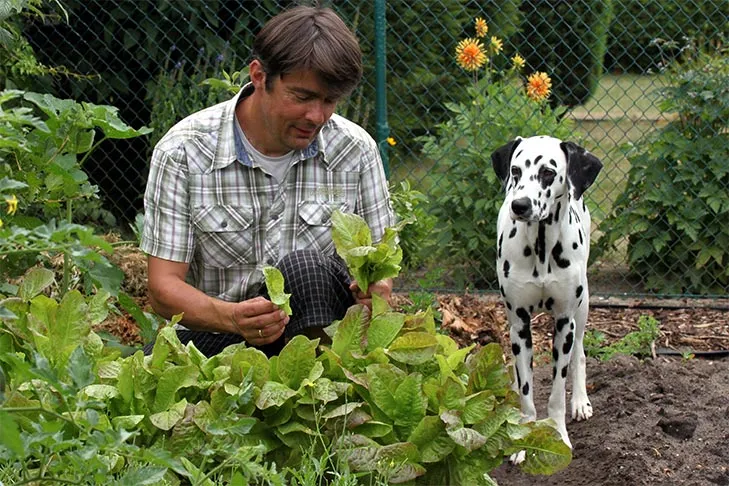 Dalmatian watching a man gardening
Dalmatian watching a man gardening
Vegetables Dogs Should AVOID
Just as with fruits, while many vegetables can be a healthy addition to a dog’s diet, others can be toxic, harmful, or simply not beneficial for them to consume. This section focuses on what fruits and vegetables should dogs not eat when it comes to vegetables, listing those that should never make their way into your dog’s bowl.
Asparagus
While asparagus is not considered toxic for dogs, there’s generally no significant benefit to feeding it to them. Raw asparagus is quite tough and fibrous, making it difficult for dogs to chew and digest properly, potentially leading to choking or gastrointestinal upset. By the time asparagus is cooked down to a soft enough consistency for dogs to eat safely, it loses much of its nutritional value. Given the effort involved and the minimal return, it’s usually better to choose other more nutritious and easily digestible vegetable options if you want to share a veggie with your dog.
Mushrooms (Wild)
Wild mushrooms can be extremely toxic and dangerous for dogs. While there are tens of thousands of mushroom species worldwide, and only a relatively small percentage are known to be poisonous, the toxic ones can cause severe illness, organ damage, or even be fatal. It is impossible for an untrained eye to differentiate between safe and poisonous wild mushrooms. Therefore, all wild mushrooms found outdoors should be considered a solid “no” for dogs. On the other hand, thoroughly washed mushrooms purchased from a supermarket for human consumption (like cremini, button, or portobello) are generally considered safe for dogs in small, cooked quantities, as they are not typically among the toxic varieties. However, always exercise caution and when in doubt, avoid.
Onions, Garlic, Leeks, and Chives
Dogs should never eat onions, garlic, leeks, or chives. These vegetables belong to the Allium family of plants, which are poisonous to most pets, especially cats, but are highly toxic to dogs too. Consuming any of these can cause damage to a dog’s red blood cells, leading to hemolytic anemia. Symptoms of poisoning can include vomiting, diarrhea, stomach pain, nausea, lethargy, weakness, and pale gums. Poisoning from Allium plants tends to be more severe in certain Japanese breeds like Akitas and Shiba Inus, but all dogs are susceptible. If you suspect your dog has eaten any amount of these plants, contact your veterinarian immediately. It is crucial to prevent children from sharing foods containing onions or garlic with your dog and to secure all leftovers and cooking scraps where your dog cannot access them. For pet owners interested in promoting their dog’s growth, it’s important to remember that such toxic foods should never be considered, and you should always stick to safe options when thinking about what can i feed my dog to make him bigger.
Conclusion
Understanding what fruits and vegetables should dogs not eat is a fundamental aspect of responsible pet ownership. While our intentions are always to share our love and healthy snacks with our canine companions, it’s clear that not all human foods are safe for them. From the hidden toxins in avocado and cherry pits to the severe dangers of grapes, raisins, and the Allium family (onions, garlic, leeks, chives), being informed can prevent serious health emergencies.
Always remember that dogs have different digestive systems and nutritional needs than humans. When in doubt about whether a fruit or vegetable is safe, it’s always best to err on the side of caution and avoid feeding it to your dog. Stick to known dog-safe options like apples (without seeds/core), bananas, blueberries, carrots, and green beans, always in moderation and properly prepared. If you’re ever unsure or if your dog has accidentally ingested a potentially harmful food, contact your veterinarian immediately for guidance. Your vigilance ensures your beloved dog remains happy, healthy, and safe.
References
- American Kennel Club (AKC) – Expert Advice articles on canine nutrition and toxic foods.
- Veterinary medical resources and guidelines on pet toxicology.
